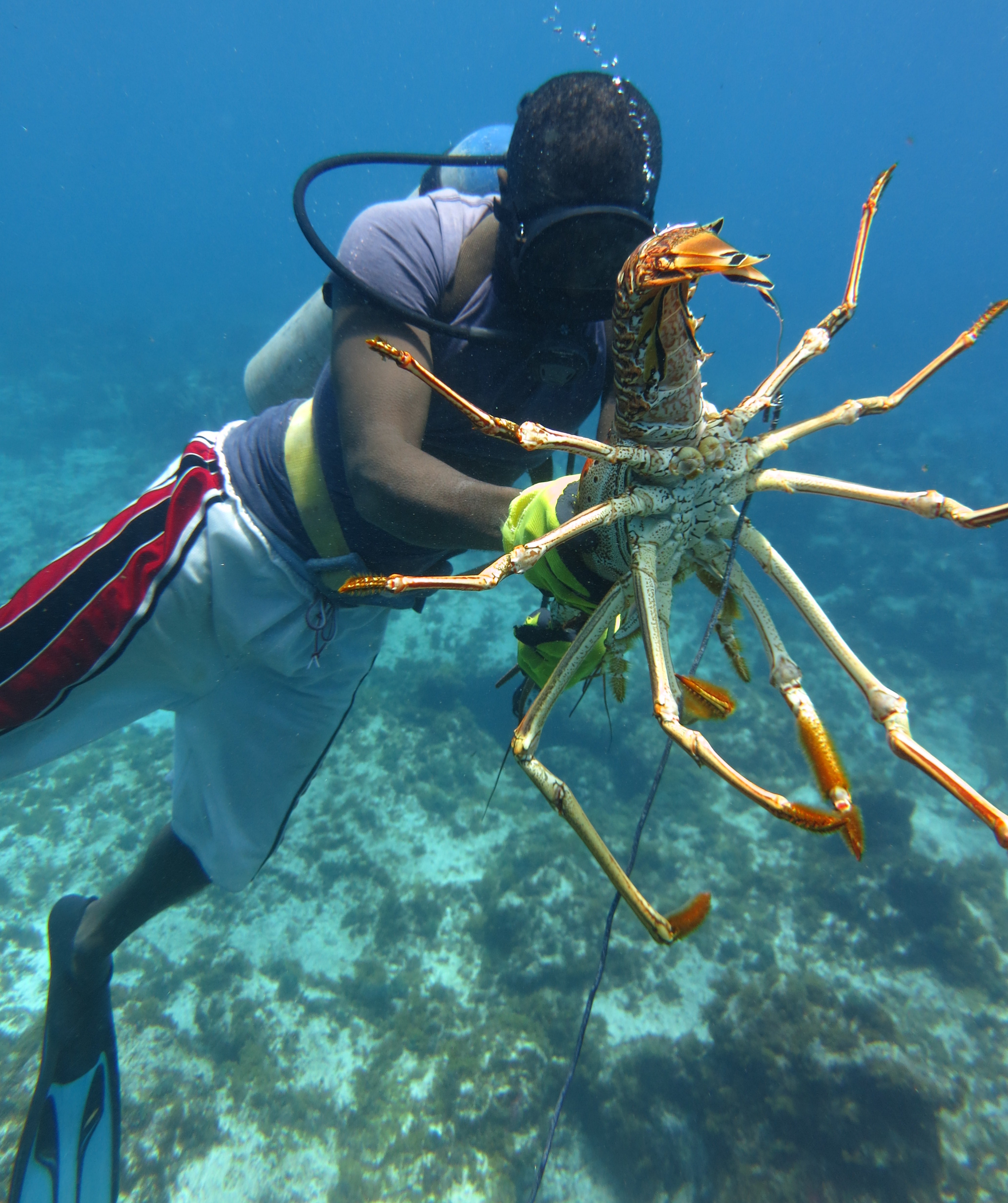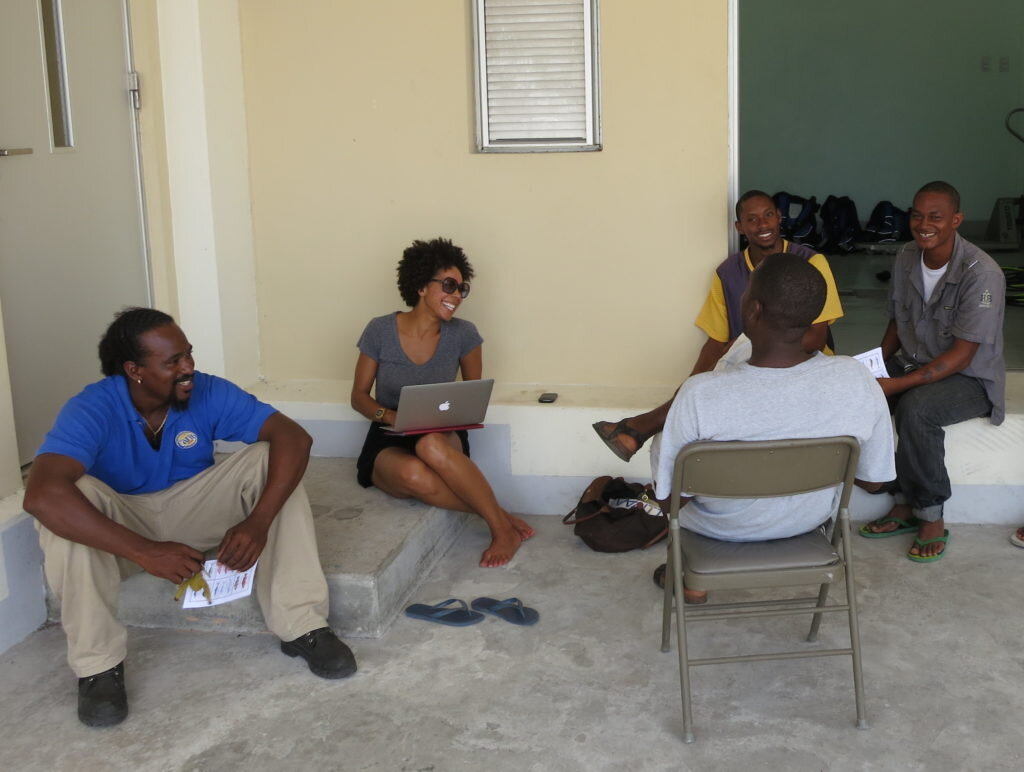3 Questions to Save the Ocean
Originally published on the (now archived) National Geographic blog.
November 27, 2013
Ayana interviewing Barbuda Fisheries and Park staff about their concerns and priorities regarding ocean management.
- What are your concerns?
- What do you want your ocean to look like?
- How can we help you get there?
Concept: Empower communities to create a community-driven, science-based sustainable ocean policy that address their concerns, by providing tools and information.
Of course, it’s never that simple, but that’s the approach we’re taking in Barbuda, where I’m leading the Waitt Institute's role in the Barbuda Blue Halo Initiative. I’ve spoken with hundreds of people, and here are the principal responses I have heard to those three questions:
What are your concerns? There is MUCH less of everything – fish, lobster, conch. Outsiders are coming in and overfishing. There is new fishing targeted at parrotfish, the key herbivores. People are now using nets and bleach on the reefs. There is too much fishing in the lagoon, the key nursery habitat. People are catching juveniles and catching lobster with eggs. There is not enough access to markets to sell fish. Some species (like large groupers and parrotfish) are disappearing, and new, invasive species (like lionfish) are arriving. [Sadly, these concerns are becoming more and more universal.]
Non-Barbudan fisher with his netted catch of parrotfish.

What do you want your ocean to look like? More fish and healthier reefs that support better livelihoods for fishermen and a strong tourism sector. Restored coastal fisheries so fishermen don’t have to go so far offshore (dangerous in small boats) and spend so much money on fuel. Back to the way things were: people fishing responsibly, using methods that didn’t damage the habitats, taking only what they could sell, not taking all the parrotfish that clean the reef, and not taking too much of any one thing in one place. Future generations fishing and eating fish, and knowing what a maca chub is. (It’s a big parrotfish, whose numbers have plummeted.)
How can we help you get there? Provide data about the fisheries and the reefs. Share ideas for policies to address these concerns and restore the ocean. Compile information on what has worked elsewhere. Answer questions about marine biology. Provide education to the kids and the community about the ocean and the reefs. Suggest ways to enforce coastal regulations, because without enforcement it is all meaningless.
Barbudan fishermen take a break from dominos to discuss ocean zoning with the Waitt Institute team. [Photo: Will McClintock]
After hearing these responses, and many incredible anecdotes and ideas (that I’ll be sharing in other posts), we are offering some recommendations and potential solutions:
- Create a licensing system to control who fishes.
- Set aside 1/3 of the coastal area in sanctuary zones where there is no fishing, so those areas can be perpetual sources of replenishment for the 2/3 where fishing continues.
- Close the lagoon (key nursery habitat) to fishing for two years, then consider allowing limited fishing.
- Ban the use of nets on the reefs.
- Prohibit the catch of parrotfish and urchins.
- Limit catch of sharks to traditional use/local consumption, to prevent commercial fishery or finning from developing.
- Require escape gaps in all fish traps to reduce bycatch.
- Engage fishers in enforcement as “Sea Wardens.”
- Set up a fund dedicated to monitoring and enforcement.
- Create an advisory board of stakeholders that can help the local government implement and improve upon coastal management.
- Consider fisheries certification via Fair Trade USAto open up new markets and get a good price for the catch.
While there are key universal elements to sustainable management, the details of a plan must address the specific concerns of the community, be appropriate for the cultural context, and minimize any negative impacts on livelihoods.
Barbuda Fisheries and Park officers consider marine enforcement options.
When you ask these questions you begin to hear solutions. Barbudans, and communities everywhere, want a healthy and abundant ocean that supports their economy and culture. Conservation and sustainable management can stem from asking people about their concerns and their vision; it doesn’t need to come from outsiders telling people what they should do, what’s best for them.
Just ask. They’ll tell you what can work – and they’ll certainly tell you what won’t.



![Barbudan fishermen take a break from dominos to discuss ocean zoning with the Waitt Institute team. [Photo: Will McClintock]](https://images.squarespace-cdn.com/content/v1/5b5a301e0dbda385e213c811/1620743746092-QHBD8PUIS5KSF4VGOODA/SeaSketch+at+Dominos.jpeg)
